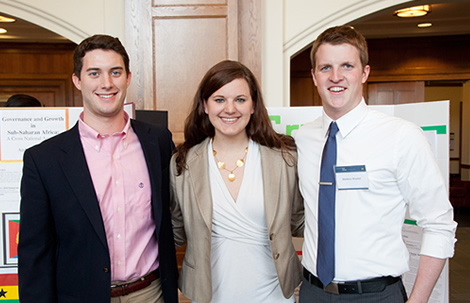
Katharine D'Hondt (BA '12) wants to help you find a job. Not you, specifically, unless you've just graduated and have an interest in federal service. An intern in the U-M's Michigan in Washington Program (MIW) in fall 2011, D'Hondt's research paper examined the role economic forces may play in whether recent college graduates decide to enter the workforce or pursue graduate education.
"I was with the Partnership for Public Service (PPS), which is an NGO dealing with federal government hiring reform," D'Hondt explains. "I just love that I was able to help people my age understand what the federal government is doing and understand that there's a role for them there."
D'Hondt wrote the organization's newsletter, which goes out to more than 6,000 federal human resources professionals and campus job representatives on PPS's "Call to Serve" network.
The Ford School encourages undergraduates to pursue off-campus programs related to their interests, including Michigan in Washington. In 2011, three BAs participated in MIW: D'Hondt, along with Matthew Woelfel and Andrew Beilein. All three were also nominated for participation in the Ford School's annual Gramlich Showcase of Student Work on the strength of research papers they wrote as part of MIW.
"The MIW candidates have gotten stronger and stronger," says Ford School public policy professor and director of Michigan in Washington, Edie Goldenberg. MIW now sends 45–50 students to DC every year, including two Ford School BAs this past semester, to do internships for federal agencies, NGOs, and a spectrum of arts and cultural institutions. MIW helps identify the internships, but students secure their own opportunities. "I wanted the students to develop job-seeking skills," Goldenberg explains. "I wanted them to have a personal investment in the place they went."
That's certainly true of Matthew Woelfel (BA '12), who completed the MIW program during the winter 2011 term. His interests focus on environmental policy and the move toward clean energy. Woelfel's research explored solutions to the U.S. military's dependence on petroleum. "Weaning ourselves off oil is something I've always been interested in," says Woelfel. "It has a lot of implications as far as the healthcare industry, industrial manufacturing industries, national security interests, and the economy."
While in DC, Woelfel worked for the Center for American Progress (CAP) on the organization's energy and environment team, where he wrote a daily news round-up of anything energy- and environment-related, such as new policies introduced in the U.S. House or the recent spikes in oil prices.
 |
|
Left: L–R: Andrew Beilein (BA '12), Katharine D'Hondt (BA '12), and Matthew Woelfel (BA '12) at the 2012 Gramlich Showcase of Student Work |
Woelfel recalls, "The second facet of the job was working beneath a senior fellow, and so I was paired with Michigan graduate Dan Weiss (MPP '80). He would write an article and would need facts to support it or would need links to different reports that were made, and so the interns had to go through and find those things. On top of that, I had the opportunity to write an article about nuclear policy in the wake of the Fukushima disaster."
It's no coincidence that Woelfel was able to find an internship working with Weiss, who is senior fellow and director of climate strategy at CAP. U-M alums continue to champion MIW, mentoring and providing internship opportunities, and that energy is part of what helped the program get off the ground. The match between MIW and Ford School BAs works, in part, because the BA program emphasizes experiential learning and MIW provides it.
Goldenberg explains, "They become expert networkers, many have found employment," including D'Hondt, who will begin working for PPS soon after graduation as a program associate for the education and outreach team. "They get exposed to public service, culture, and big city life in a dynamic national capital."
Andrew Beilein (BA '12) was inspired by his internship to research whether democratic governance in sub-Saharan Africa leads to better economic outcomes. Beilein's interests are foreign policy and national security, so his internship at the National Defense University (NDU), also in winter 2011, was a natural progression.
"NDU is a program that trains ranking civilian officials and ranking military officers," he explains. "NDU offers a crash course in leadership, regional security studies, and policy objectives around the world." Beilein chuckles as he explains that he worked for two instructors at the university. "I had to serve as liaison between the instructors and students, which was cool because the students are colonels and captains in the military."
About participating in MIW, Beilein observes, "Going from, say, one professor telling you about politics while you have your own ideas in mind is different than, say, interacting with a ton of people every day who have been involved in the process for so many years and all have their own unique stories to tell."
Below is a formatted version of this article from State & Hill, the magazine of the Ford School. View the entire Spring 2012 State & Hill here.